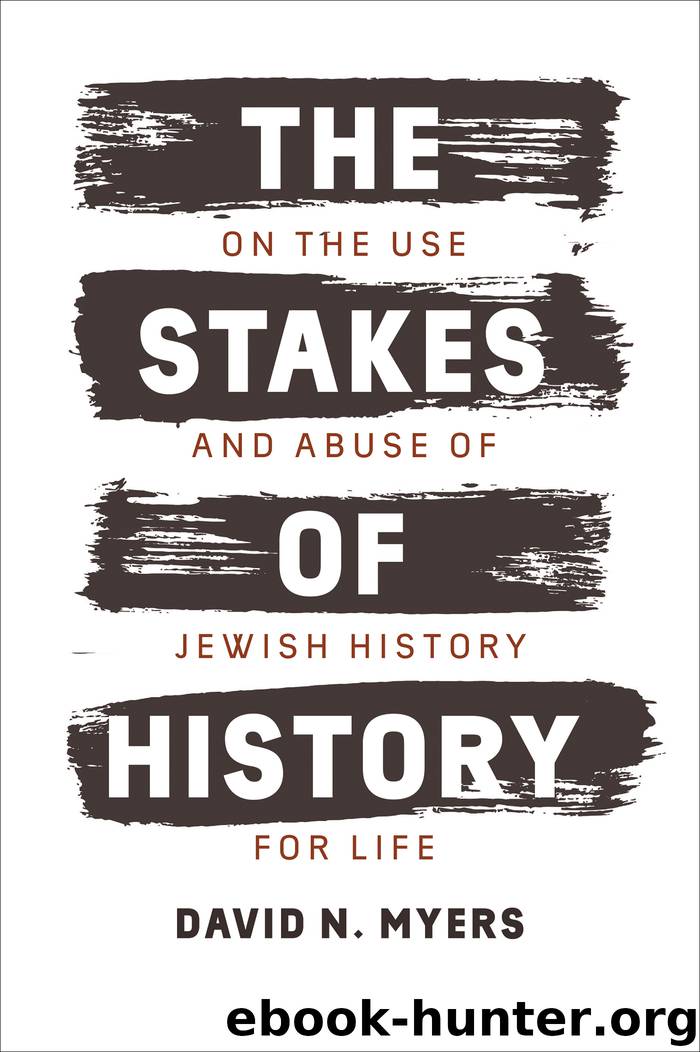The Stakes of History by David N. Myers

Author:David N. Myers
Language: eng
Format: epub
Publisher: Yale University Press
Published: 2017-01-10T05:00:00+00:00
CONCLUSION
The Historian Between Remembering and Forgetting
Richard Evans and Deborah Lipstadt represent related though distinct sensibilities regarding the historian’s function as witness and fortifier of memory. These sensibilities suggest to us that the stakes of historical recollection—and the historian’s labor—are especially high in confronting the Holocaust. What must be remembered? What lessons are to be learned?
These questions have stimulated an impassioned debate among recent thinkers. They are responding to the growing tension between the rapid pace of change in our twenty-first-century cyber universe, in which there is a new headline or tragedy in every hourly turn of the news cycle, and the need to remember traumatic events and tragedies, which occur with unsettling frequency in our time. In one of the most direct engagements, the writer and reporter David Rieff argues forcefully in In Praise of Forgetting that collective remembrance is decidedly unstable, often ineffective, and full of the potential to lead to myopic chauvinism. He deals in considerable detail with the Jewish impulse to remember, as well as with Yosef Yerushalmi’s Zakhor. Tacking back and forth between the virtues and dangers of forgetting, he concludes that “remembrance, however important a role it may and often does play in the life of groups, and whatever moral and ethical demands it not only responds to but often can fulfill, carries with it political and social risks that at times also have an existential character.” Rieff suggests that even the canonical post-Holocaust mantra “Never Again” could fall prey to these risks.1
Two historians with distinctive angles on the Holocaust have recently offered strikingly different responses to the question of what can be learned from history in general and the Holocaust in particular. The Toronto historian Michael Marrus provides valedictory wisdom as an elder statesman of Holocaust research in questioning our ability to derive any single coherent or universal lesson from the study of the Shoah. “There are many purported lessons out there,” he asserts, “and they cannot all have the same transcendent significance or validity.” History, he continues, “does not speak to the present with so clear an admonitory voice.”2
By contrast, Timothy Snyder, author of a number of major works on eastern European history, including two volumes that challenge our understanding of the Holocaust, concludes Black Earth by insisting that the history of the Holocaust must be recorded in order to be understood, and “it must be understood so that its like can be prevented in the future.”3 Moving from the abstract to the concrete, as well as from the past to the present, Snyder urges us to recognize that state power, with all its risks and dangers, offers far more stability and freedom than a stateless world. “When states are absent,” Snyder declares, “rights—by any definition—are impossible to sustain.”4
This contrast between Marrus and Snyder calls to mind my discussion in the previous chapter of Carlo Ginzburg and Robert Cover, who offered differing visions of the scholarly mission with consequences for our thinking about history and the historian as witness. In comparing the historian
Download
This site does not store any files on its server. We only index and link to content provided by other sites. Please contact the content providers to delete copyright contents if any and email us, we'll remove relevant links or contents immediately.
| Africa | Americas |
| Arctic & Antarctica | Asia |
| Australia & Oceania | Europe |
| Middle East | Russia |
| United States | World |
| Ancient Civilizations | Military |
| Historical Study & Educational Resources |
Cecilia; Or, Memoirs of an Heiress — Volume 1 by Fanny Burney(32543)
Cecilia; Or, Memoirs of an Heiress — Volume 2 by Fanny Burney(31939)
Cecilia; Or, Memoirs of an Heiress — Volume 3 by Fanny Burney(31928)
The Secret History by Donna Tartt(19037)
Sapiens: A Brief History of Humankind by Yuval Noah Harari(14360)
Leonardo da Vinci by Walter Isaacson(13315)
The Radium Girls by Kate Moore(12013)
Sapiens by Yuval Noah Harari(5363)
How Democracies Die by Steven Levitsky & Daniel Ziblatt(5211)
The Wind in My Hair by Masih Alinejad(5085)
Homo Deus: A Brief History of Tomorrow by Yuval Noah Harari(4901)
Endurance: Shackleton's Incredible Voyage by Alfred Lansing(4764)
Man's Search for Meaning by Viktor Frankl(4574)
The Silk Roads by Peter Frankopan(4525)
Millionaire: The Philanderer, Gambler, and Duelist Who Invented Modern Finance by Janet Gleeson(4462)
The Rape of Nanking by Iris Chang(4201)
Joan of Arc by Mary Gordon(4098)
The Motorcycle Diaries by Ernesto Che Guevara(4088)
Stalin by Stephen Kotkin(3956)
